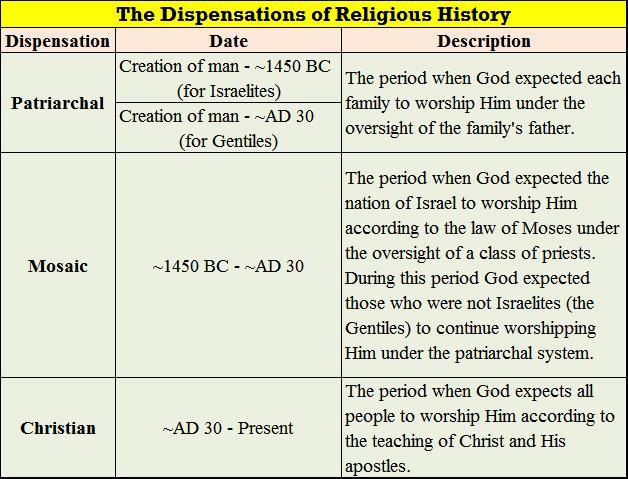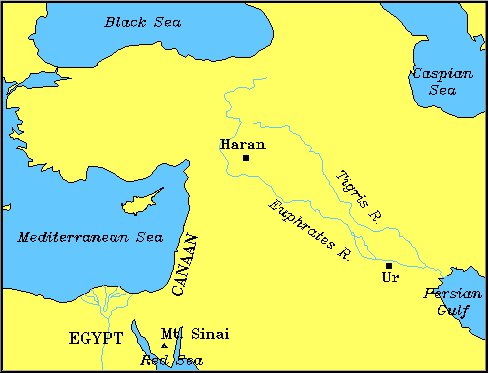
Lesson 6
THE PROMISES TO ABRAHAM
King James Version (KJV)
Among those who lived in the early days of Bible history (in the Patriarchal dispensation {see table}), Abraham is perhaps the most revered. He was a man of great faith who became the father of the Jews. God made several significant promises to Abraham. These promises are so important in God's plan of redemption that the rest of the Bible can be thought of as the unfolding of their fulfillment.

1. The Promises Given
At the time God first gave the promises, Abraham (Abram) was living among the Chaldeans in Mesopotamia (Acts 7:2-4), the broad valley of the Tigris and Euphrates rivers (see map below). From there he traveled toward the land of Canaan but stopped first in the city of Haran until his father died. God repeated the promises to Abraham in Haran. Now the LORD had said unto Abram, Get thee out of thy country, and from thy kindred, and from thy father's house, unto a land that I will shew thee And I will make of thee a great nation, and I will bless thee, and make thy name great; and thou shalt be a blessing: And I will bless them that bless thee, and curse him that curseth thee: and in thee shall all families of the earth be blessed." (Gen. 12:1-3)
Following the death of his father, Abraham and those with him entered the land of Canaan. Here God added another promise to those He had already given: And And the LORD appeared unto Abram, and said, Unto thy seed will I give this land: " (Gen. 12:7).
2. The Promises Analyzed
Three distinct promises appear in these two texts. The first is a nation promise, stated in Gen. 12:2 by the words And I will make of thee a great nation. The second is a land promise, stated in Gen. 12:7 by the words Unto thy seed will I give this land: The third is the seed promise, stated in Gen. 12:3 by the words: and in thee shall all families of the earth be blessed. (Later you will see the connection between this promise and the seed through whom it would be fulfilled).
a. The Nation Promise
On three more occasions God promised Abraham that He would make a great nation of his descendants. In Gen. 15:5, God said: " Look now toward heaven, and tell the stars, if thou be able to number them: and he said unto him, So shall thy seed be. " In Gen. 17:4, God said: " As for me, behold, my covenant is with thee, and thou shalt be a father of many nations. " Finally, in Gen. 22:17, God told him: " I will bless thee, and in multiplying I will multiply thy seed as the stars of the heaven, and as the sand which is upon the sea shore; and thy seed shall possess the gate of his enemies."
Years later God renewed the promise to Isaac, Abraham's son: And I will make thy seed to multiply as the stars of heaven (Gen. 26:4). God also renewed the promise to Jacob, Abraham's grandson: " And thy seed shall be as the dust of the earth, and thou shalt spread abroad to the west, and to the east, and to the north, and to the south: " (Gen. 28:14).
b. The Land Promise
The most complete statement of the land promise is given in Gen. 15:12-18. God appeared to Abraham while he was in a deep sleep and described the extent of the territory that his descendants would possess. God also listed five key events that would occur before the land promise was fulfilled
- Abraham would live a long life but would not live to see the promise fulfilled, Gen.: 15:15.
- Abraham's descendants would be enslaved and oppressed four hundred years in a land that was not their own, Gen. 15:13.
- After this time, God would judge the nation holding Abraham's descendants captive and would permit his descendants to come out of bondage with many possessions, Gen. 15:14.
- In the fourth generation Abraham's descendants would return to the land of Canaan, Gen. 15:16.
- Abraham's descendants would not possess the land until the Amorites, who lived in and near the land of Canaan, had become much more wicked, Gen. 15:16.

In Gen. 15:18, God gave the limits of the promised land: On that day the Lord made a covenant with Abram, saying, " Unto thy seed have I given this land, from the river of Egypt unto the great river, the river Euphrates: " These rivers marked the southwestern and northeastern extremes of the land.
c. The Seed Promise
When God first stated the seed promise to Abraham, Abraham was 75
years old and did not have a son through whom the promise could be
fulfilled. Twenty-five years later his wife, Sarah, at the age of
90, gave birth to Isaac. While Isaac was still young and Abraham
was over 100 years old, God tested Abraham's faith by commanding
him to sacrifice Isaac on an altar. Remarkable as it may seem,
Abraham was willing to obey. He believed God would bring Isaac
back from the dead if necessary (Heb. 11:17-19). After this
astounding demonstration of Abraham's faith, God repeated the
promises to him including the seed promise (Gen. 22:18):
"And in thy seed shall all the nations of the earth be blessed; because thou hast obeyed my voice."
God also repeated the promise to Isaac (Gen. 26:4) and to Jacob (Gen. 28:14).
3. The Promises Fulfilled
The nation promise was fulfilled at the beginning of the Mosaic dispensation (see table), the second great era of human religious history. The land promise was fulfilled less than a hundred years later, while still in the Mosaic dispensation. The seed promise was fulfilled over a period of years that began at the close of the Mosaic dispensation and continues to be fulfilled in the Christian dispensation (see table), the third and last great era of religious history.
a. The Nation Promise
God fulfilled the nation promise about 650 years after announcing it to Abraham. When Moses led the Israelites out of Egyptian bondage, they had an army of over 600,000 men. The total population was perhaps 2 to 3 million. At Mt. Sinai three months later, God made a national covenant with them: Now therefore, if ye will obey my voice indeed, and keep my covenant, then ye shall be a peculiar treasure unto me above all people: for all the earth is mine And ye shall be unto me a kingdom of priests, and an holy nation...All that the LORD hath spoken we will do. " (Exo. 19:5-6a, 8). At Mt. Sinai, the descendants of Abraham, Isaac, and Jacob officially became a nation.
b. The Land Promise
After spending forty years in the desert wastes between Egypt and Canaan, the Israelites marched toward the promised land. Their first major military encounters were with two armies of Amorites in the highlands east of the Jordan River. They routed their opponents and took possession of the lands held by the defeated kings (Num. 21:21-35).
Moses was the leader of the Israelites in these early battles, but he died several months afterwards, and Joshua took his place. Joshua led the Israelites across the Jordan River and into the land of Canaan. Josh. 5-12 describes the conquest of the land. When the land had been secured, Joshua divided it among the twelve tribes of Israel. At this point it could be written: And the LORD gave unto Israel all the land which he sware to give unto their fathers; and they possessed it, and dwelt therein (Josh. 21:43).
c. The Seed Promise
The seed promise did not begin to be fulfilled until almost 2000 years after the time of Abraham. The fulfillment began when a virgin named Mary gave birth to a baby boy, named Jesus (Matt. 1:18-25), just as the prophet Isaiah had predicted (Isa. 7:14). He was born in the town of Bethlehem (Matt. 2:1) as the prophet Micah had foretold (Mic. 5:2).
Jesus was the Christ (the Anointed One) and the Son of God: But when the fulness of the time was come, God sent forth his Son, made of a woman, made under the law, To redeem them that were under the law, that we might receive the adoption of sons. (Gal. 4:4-5). Jesus was the seed God promised to Abraham in Gen. 22:18: Now to Abraham and his seed were the promises made. He saith not, And to seeds, as of many; but as of one, And to thy seed, which is Christ (Gal. 3:16).
The mere birth of the seed did not completely fulfill the seed promise. The promise stated that through the seed all the families of the earth would be blessed. It was only after He was crucified, died for the sins of the world, and was raised from the dead that all nations could be blessed through Him. The era of international blessings through Christ, the Christian dispensation, was ushered in when the apostles of Christ began to preach the gospel of salvation from sin a few days after Jesus left the earth and returned to heaven (Acts 1-2).
If you have difficulties in exercising this lesson procedure, please send an E-mail message describing the difficulty to:
webmaster@jordanpark.org
Be sure to specify the following:
1. Lesson number,
2. Bible version,
3. Your browser name and version,
4. Your operating system.
5. Any error message(s)
Visit the Jordan Park Homepage
© 2020, 1998 JORDAN PARK CHURCH OF CHRIST
HUNTSVILLE, ALABAMA